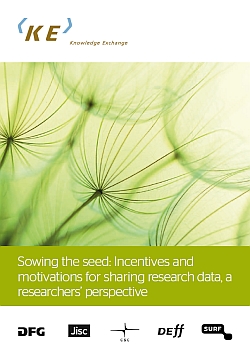Posted: March 1st, 2015 | Author: Sven | Filed under: Data Sharing | Tags: Data Sharing, incentives | Comments Off on Paper on the Incentives for Academic Data Sharing published: „What Drives Academic Sharing?“
 Benedikt Fecher, Sascha Friesike, and Marcel Hebing have published another paper presenting further results of their study concerning academic data sharing. Since data sharing enables researchers to verify results and to pursuit new research questions with “old” data, it is of particular importance for scientific progress.
Benedikt Fecher, Sascha Friesike, and Marcel Hebing have published another paper presenting further results of their study concerning academic data sharing. Since data sharing enables researchers to verify results and to pursuit new research questions with “old” data, it is of particular importance for scientific progress.
Fecher, Friesike, and Hebing conducted a systematic review of 98 scholarly papers as well as an empirical survey among 603 secondary data users. In order to explain the data sharing process from the primary researcher’s point of view, the authors introduce a conceptual framework based on the analyses. They divide the data sharing process into six descriptive categories: data donor, research organization, research community, norms, data infrastructure, and data recipients. Read the rest of this entry »
Posted: November 13th, 2014 | Author: Sven | Filed under: Data Sharing, Report | Tags: incentives, Knowledge Exchange | Comments Off on New KE-Publication: “Sowing the seed” #Update
 A few days ago, Knowledge Exchange (KE) – a cooperation of five national funding organisations (DFG, Surf, DEFF, CSC and JISC) – has just released a new publication, titled “Sowing the seed: Incentives and motivations for sharing research data, a researchers’ perspective.”
A few days ago, Knowledge Exchange (KE) – a cooperation of five national funding organisations (DFG, Surf, DEFF, CSC and JISC) – has just released a new publication, titled “Sowing the seed: Incentives and motivations for sharing research data, a researchers’ perspective.”
This qualitative study has gathered evidence, examples and opinions on current and future incentives for research data sharing from the researchers’ point of view, in order to provide recommendations for policy and practice development on how best to incentivize data access and re-use.
Incentives and motivations ask for development of a data infrastructure with rich context where research data, papers and other outputs or resources are jointly available within a single data resource. Different types of data sharing and research disciplines need to be acknowledged. Read the rest of this entry »
Posted: October 9th, 2014 | Author: Sven | Filed under: found on the net, Projects | Tags: academic publishing, Data Sharing, incentives, metrics | Comments Off on PLOS, CDL, and DataONE join forces to build incentives for data sharing
 The open access publisher PLOS (Public Library of Science), the University of California Curation Center at the California Digital Library, and DataONE announced the launch of a new project to develop data-level metrics. The project, titled “Making Data Count: Developing a Data Metrics Pilot” is funded by the National Science Foundation (NSF) in the US. The project will result in a suite of metrics that track and measure data use.
The open access publisher PLOS (Public Library of Science), the University of California Curation Center at the California Digital Library, and DataONE announced the launch of a new project to develop data-level metrics. The project, titled “Making Data Count: Developing a Data Metrics Pilot” is funded by the National Science Foundation (NSF) in the US. The project will result in a suite of metrics that track and measure data use.
The need for such a data metrics pilot is obvious: Sharing data is time consuming and researchers need incentives for undertaking the extra work. Metrics for data will provide feedback on data usage, views, and impact that will help encourage researchers to share their data. This project will explore and test the metrics needed to capture activity surrounding research data. Read the rest of this entry »
Posted: March 4th, 2013 | Author: Sven | Filed under: Data Sharing, EDaWaX | Tags: incentives, research paper | 4 Comments »
 In the context of our research project EDaWaX a new research paper has been published by Patrick Andreoli-Versbach (International Max Planck Research School for Competition and Innovation (IMPRS-CI), LMU Munich, Munich Center for Innovation and Entrepreneurship Research (MCIER)) and Frank Mueller-Langer (Max Planck Institute for Intellectual Property and Competition Law, IMPRS-CI, MCIER).
In the context of our research project EDaWaX a new research paper has been published by Patrick Andreoli-Versbach (International Max Planck Research School for Competition and Innovation (IMPRS-CI), LMU Munich, Munich Center for Innovation and Entrepreneurship Research (MCIER)) and Frank Mueller-Langer (Max Planck Institute for Intellectual Property and Competition Law, IMPRS-CI, MCIER).
The paper analyzes the data sharing behavior of 488 randomly chosen empirical economists. More specifically, the researchers under study were chosen uniformly across the top 100 economics departments and the top 50 business schools and randomly within the respective institution. Economics departments were chosen using the Shanghai Ranking 2011 in Economics and Business and business schools were chosen using the Financial Times Global MBA Ranking 2011.
Read the rest of this entry »
Posted: February 15th, 2012 | Author: Sven | Filed under: Data Sharing | Tags: incentives, Open Data | Comments Off on Incentives for Data Sharing: £8.000 a year for promoting open data!
 When I first heard, that the Panton Fellowships offer the possibility to get £8.000 bucks in a year for making scientific data open, I thought this was a joke. Some kind of an idea that might only cause windfall gains by scientists needing a funding budget. But it is worth taking a deeper look:
When I first heard, that the Panton Fellowships offer the possibility to get £8.000 bucks in a year for making scientific data open, I thought this was a joke. Some kind of an idea that might only cause windfall gains by scientists needing a funding budget. But it is worth taking a deeper look:
The Panton Fellowships are funded by the Open Society Foundations. The coordination is done by the Open Knowledge Foundation. The Fellowshops will be awarded to scientists who actively promote open data in science.
Read the rest of this entry »
Posted: November 3rd, 2011 | Author: Sven | Filed under: Data Sharing | Tags: barriers, Data Sharing, incentives | Comments Off on Data Publishing: arguably a good thing-but there isn’t that much of it. Why?

“If the data and related metadata collected for impact evaluations was more readily discoverable, searchable, and made available, the world would be a better place. “
With this global statement Markus Goldstein, a researcher of the World Bank, started his blogpost about a better access to impact evaluation data. For Goldstein, the advantages to access this kind of data are overwhelming:
“It would be easier to replicate studies and, in the process, to expand them by for example: trying other outcome indicators; checking robustness; and looking for heterogeneity effects (e.g. gender). There is also a wealth of other things one could do with the related metadata, including: looking at how different wording of survey questions generates different answers and getting parameters for power calculations. Last but not least, making these data available would allow for a wide range of non-impact evaluation research.”
<br>
As reasons why researchers -despite all these great advantages- do not share their data, Goldstein states mainly three major concerns:
- The first is that researchers need some return on their investment – they spend a lot of time developing the instruments, negotiating the entire set up of both the survey and the evaluation, acquiring money and so on.
- The second reason: making data available is a painfull job he claims, because a lot of variables have to be documented – and all this in a somewhat friendly format. The whole issue get’s even more painfull, if some part of the data considers confidential information, because this takes even more careful attention.
- Third, there are no rewards or incentives in the economics profession as a whole for bearing this cost or pain.
 Benedikt Fecher, Sascha Friesike, and Marcel Hebing have published another paper presenting further results of their study concerning academic data sharing. Since data sharing enables researchers to verify results and to pursuit new research questions with “old” data, it is of particular importance for scientific progress.
Benedikt Fecher, Sascha Friesike, and Marcel Hebing have published another paper presenting further results of their study concerning academic data sharing. Since data sharing enables researchers to verify results and to pursuit new research questions with “old” data, it is of particular importance for scientific progress.
 A few days ago, Knowledge Exchange (
A few days ago, Knowledge Exchange ( The open access publisher
The open access publisher 
 When I first heard, that the
When I first heard, that the 






